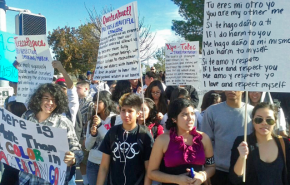Closing the classroom door in Tucson
and report on Arizona's drive to shut down an acclaimed Mexican-American Studies program in Tucson--and student efforts to resist.
THE TUCSON Unified School District dismantled its Mexican-American Studies program after the state school superintendent threatened to cut off $15 million in funding to the district.
Now, two weeks after the classes were shut down, teachers and students are wondering what they should read and talk about--because the state hasn't supplied any replacement for a curriculum that everyone from students to administrators insists was an engaging and valuable program for high schools in a city where a majority of students are Mexican-American.
Wrecking the Mexican-American Studies program is a pet project for John Huppenthal, now the state's top education official.
As a state legislator, Huppenthal co-wrote HB 2281 to target ethnic studies programs in public schools. Specifically, the legislation forbids courses or classes that "promote the overthrow of the United States government," "promote resentment toward a race or class of people" or "advocate ethnic solidarity instead of the treatment of pupils as individuals."

Tucson's longstanding Mexican-American Studies program does none of those things, of course. It does teach Chicano literature and art and provides a "Mexican-American perspective" on American history--subjects that ought to be of interest not just to the majority of Tucson public school students who have Mexican ancestors, but every resident of the state.
An independent audit by the education company Cambium Learning not only confirmed that the Tucson program did not violate any laws, including HB 2281, but revealed that students who took Mexican-American Studies classes graduated at an 11 percent higher rate than other students in 2010.
But in December, an administrative law judge upheld a state ruling that the program broke the ethnic studies ban--and Huppenthal, now the state school superintendent, was in a position to enforce the law he wrote. Huppenthal threatened Tucson's schools with losing 10 percent of their annual state funding. The district board voted 4-1 to succumb to Huppenthal's order rather than defy the decision.
This attack on immigrant rights and academic freedom hasn't gone unchallenged. On January 24, hundreds of Tucson high school students walked out of classes, with groups from several schools gathering outside the offices of school district administrators to protest. This was the latest in a series of demonstrations and student strikes since HB 2281 became law in 2010, including an April 2011 protest in which students chained themselves together and took over a school district board meeting to demand their voices be heard.
"I think it's very unfair that people here don't let us learn about our own culture," Cholla High School student Ahtziri Iñiguez told writer Jeff Biggers. Iñiguez added, "We did this walkout to prove if you want something, you should fight for what you believe in, because if you don't do anything, nothing will change."
THE HYPOCRISY of what's taking place in Tucson is obvious. HB 2281 claims it is outlawing public school programs that "promote resentment of a particular race or class of people." But that is exactly what the law does--by scapegoating immigrants and pandering to bigotry and hate.
HB 2281 is one of a number of anti-immigrant laws passed in Arizona and signed into law. The most notorious, of course, was SB 1070--among other provisions, it legalized racial profiling by giving police the power to demand documents showing immigration status if there was "reasonable suspicion" the person might be undocumented. Much of SB 1070 was blocked by the courts, but the effect in immigrant communities was dire, leading to an exodus before the law went into effect.
The truth is that the real "ethnic chauvinism" in Arizona isn't being taught in classrooms--it's driving the anti-immigrant politicians writing hateful legislation that pits workers against workers and students against students.
Ethnic studies programs like the one in Tucson are a product of past struggles dating back to the 1960s and '70s, when activists demanded that the schools teach the history of women, people of color and other groups. HB 2281 is part of a right-wing drive to roll back the gains of those movements. With working people still suffering the effects of the recession, anti-immigrant laws are part of an attempt to deflect attention from the real sources of the crisis and onto scapegoats.
This isn't the first time Arizona school officials have shown their anti-immigrant bigotry. In April 2010, the state Department of Education told school districts that any teacher whose spoken English was deemed to be heavy accented or "ungrammatical" should be removed from classrooms. Teachers who were judged to be sub-par according to these arbitrary standards could be ordered to take classes to improve their English, or risk being reassigned or fired.
HB 2281 is another front in Arizona's war on immigrants. Social justice activists and academics need see to see the fight against the closure of the Mexican-American Studies program as their fight as well--and stand side by side with students and teachers in Arizona to defend our history and academic freedom.
We need to take an unapologetic stance that not only defends and protects such programs, but seeks to expand them so more students can benefit.


